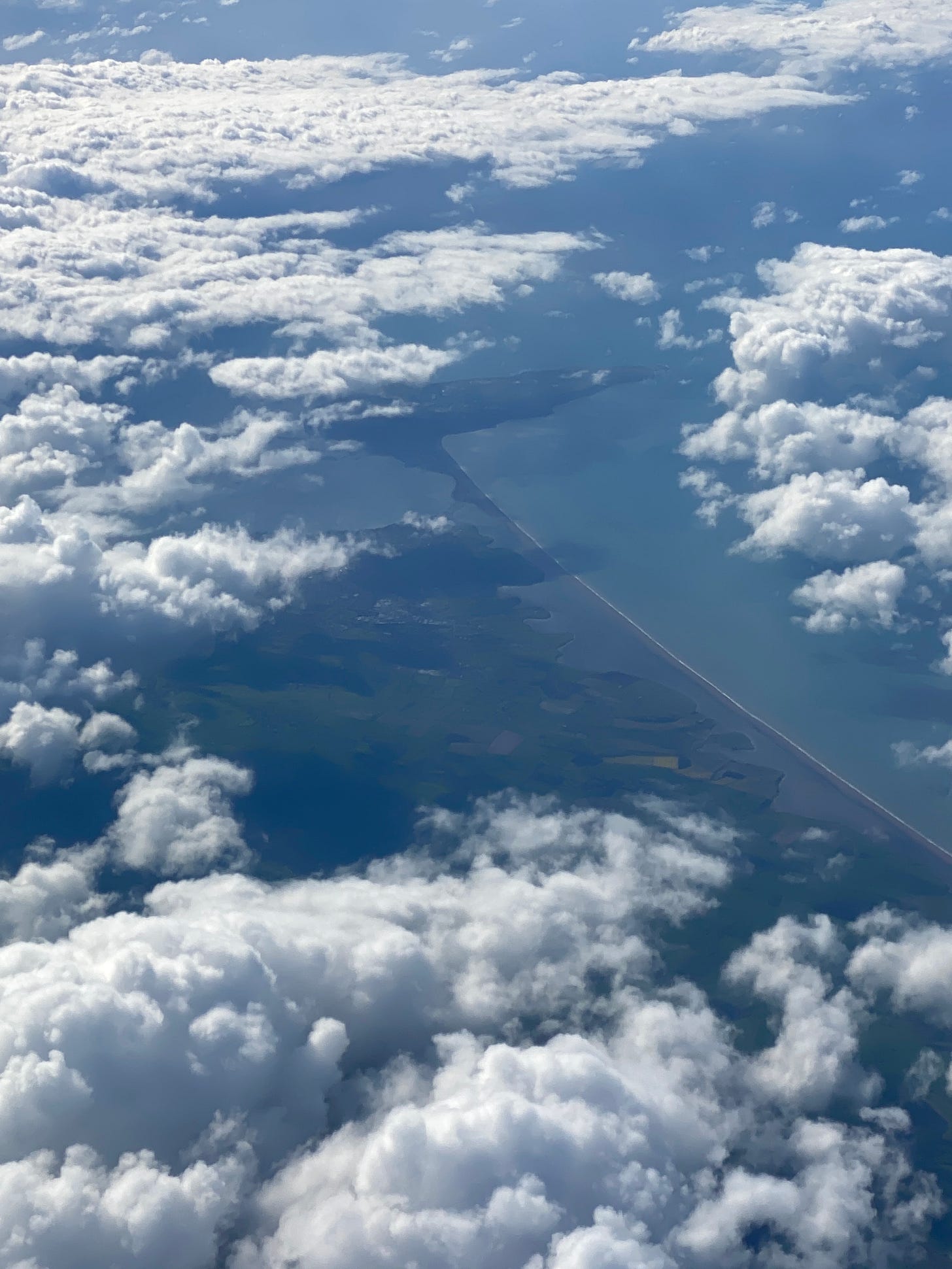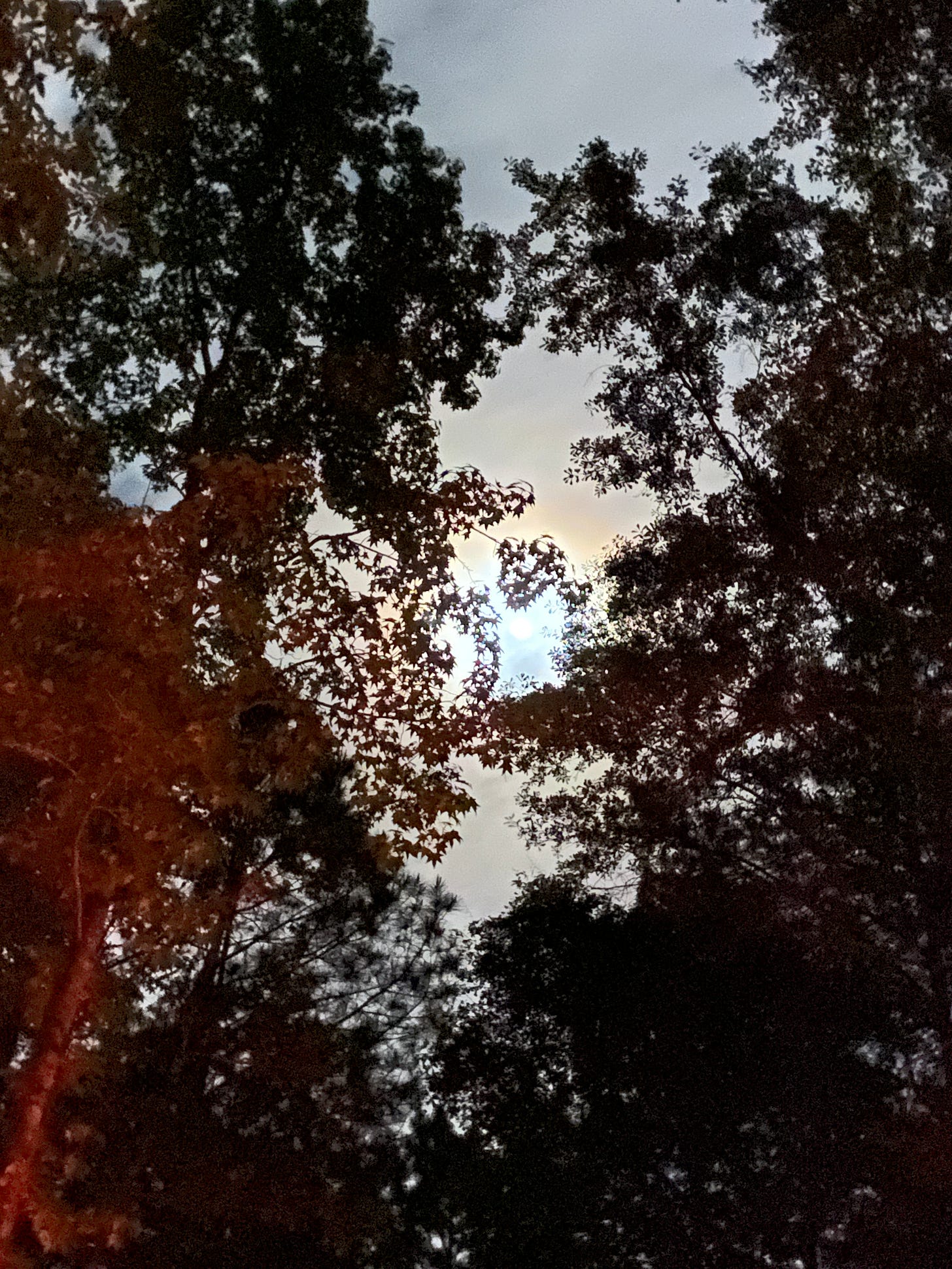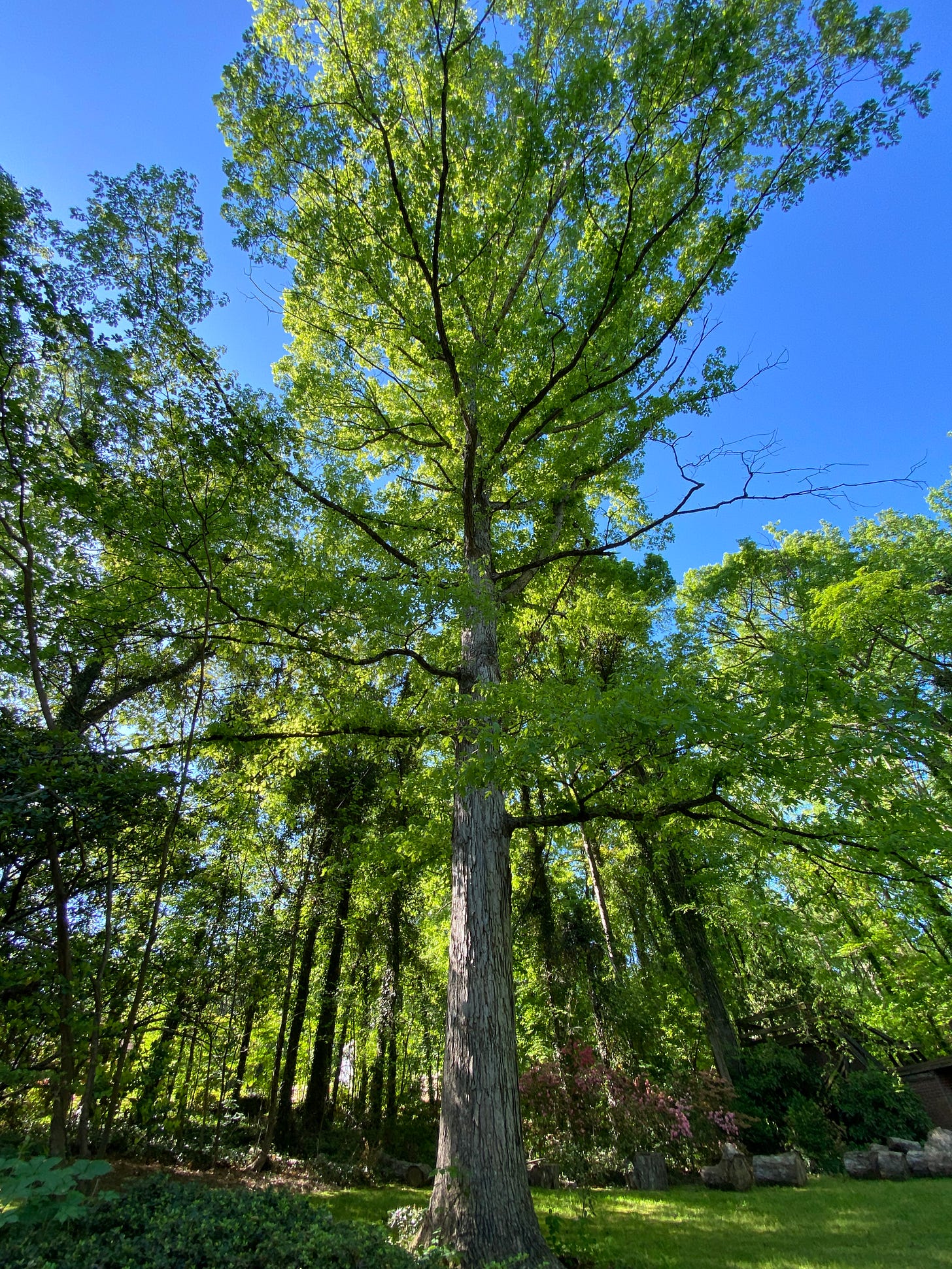I am in America, and inexplicably have no phone signal or data here despite paying for it, right after a couple of weeks in Italy, unable to upload a between-essays post at all last week. Apologies.
So, here at last are deep green thoughts beneath the Georgia trees, where it is hot and humid and the shade of early evening is welcome. Good conversation and wonderful birdsong fill the air. There is due to be a ‘Biblical storm’ tonight, so people are leaving the camp, but we are trusting in our new tent and the fact that in Britain’s south west, we’ve just had the wettest winter on record. So we don’t feel fazed. My belly is full of the quesadilla and refried beans I cooked on the little camping stove. I have hard seltzer beside me and my travelling friend in front of me. My beloved is 3600 miles away, and so I console myself with the real beauty that is present and the deep conviviality of the people around me.
May you feel it too.1
After
This Tuesday, the plane’s course took me past Bournemouth, I could not believe that I was looking down at Southbourne beach where we had just walked, from an angle I had never seen. It was as though I could look down through a rift in time, so I sent blessings back. Then our course continued along the Jurassic Coast, Studland, Purbeck, Portland, Chesil Beach, all the brightest stars in my inner coastal constellation. What edge beauty, hidden under the patches of white clouds.
Love springs up from the loam. If I wish to be leaf-like, there is no way to take up the woad and weld, the blue and yellow, to make that green I seek unless the fabric is boiled and soaped, washed and scoured. My fibres do not enjoy it! But that is the tempering of soft things, and how I’ll ever be dipped Lincoln green, as I wish to be.
May we always hold paradoxical pairs: death and life, joy and grief, the sacred and the profane, the embodied and the transcendent, the light and the dark. Being able to hold paradox is the quality of mind and heart I hold most dear in another, after trust and love have been established. (I doubt they could be firmly established without it.)
I notice how quiet my mind is, when attending to the real, in physicality. I am not sure that in sitting or even in T’ai Chi that I have been as present as I was by the sea last weekend. But this spring I am so far away from the Wiltshire bluebell woods where I trained for so many years, so I can’t gaze at that blessed and familiar forest floor, the light through those trees, the cuckoo flowers, the chalk and flint. I can’t look and make the delicious choice to not see unnecessary distinctions between all these beautiful things. So, I attempt to do it here, and welcome cicadas, wolf spiders, water oak and red earth, thousands of miles away practising patience and stoic smiles.
I wrote a blessing a few months ago at the end of the piece ‘Silex Scintillans’, as a prayer, a wish, a pure pouring out of my longing, recorded on my phone as I paced around my living room. Then I typed it up and sent out into the world here with a forlorn hope. To be answered by life is something I will never take for granted.
During
There are several ways to make a spark or a flame for a fire: flint and steel, shorting a battery, lensing the sun’s rays onto dry tinder, a pressure pump pushed closed suddenly, (if housing matter for an ember), matches, lighters, friction via a bow-drill… But once caught, the fire which warms the hearth is the same. My preferred method to light a fire is with flint from The Great Ridge Woods, a replica Saxon carbon steel, held carefully with charcloth or amadou. Strike the steel down upon the flint edge and the spark leaps upwards. Who would have thought? Then blowing gently, ember glowing, cloth placed into tinder bundle, then kindling, and taking care, the cook fire is accomplished.
Fire ascends, water descends.
Don’t rely on words. They are unimaginably shiny and attractive, even when full of darkness, when they are like jet to the Victorians who ripped the seams out of the earth to gain it for their funereal garb. Whitby boomed and the world caved in. The Old Queen missed her Teutonic beau and iron railings that were once white must suddenly be painted black. The slick black protects the iron from the rain as well as white paint did. What was the loss? Bright sparkle, an edging of joy: yet the new tradition looms. The looms are full of coal black cloth and the children lose their fingers for it. People think the British were always dour. Not so. Once we were covered in bright embroidery and deeply dyed gem-toned cloths. May we be so again.
The screens burn in our minds’ eyes, how will we walk in beauty now?
Before
There was a daughter of amnesia and unbearable pressure, caught between deliberate unknowing and a kettle tight-lidded and full of inscrutable poison. How did she survive?
By letting the real world presence to her.
She no longer asks permission, just goes ahead. And because she is now the authority in her life, when it goes wrong it feels worse for a while, because she can’t blame anyone else. But tonight she carves seven feather sticks for the hell of it, and their only purpose is to warm her loved ones.
Which reminds her of what a poet once wrote to her, of how like a log she might season, not burn in the fire after all, chopped into small kindling. And how this thought had thoroughly disgusted her at the time.
But having spent two years or more scorching, and a year after that, smouldering a little, cool ashes now held allure.
After all, slaked in captured rain, she could strip skins with them. Stretch herself tight over the beam, remove all the fat and flesh, and at last, taught as a struck drum-skin, resound.
This Week’s good thing: The Bone Cave by Dougie Strang. I was ill for three days in Italy two weeks ago and devoured Dougie’s book over two of the days. If you think there is no indigenous culture in Europe then you are wrong. If you believe that deeply moving myths, tales of wonder, of heroes and saints, old women of the mountains and of the welcoming in of strangers are something from elsewhere then it is time to look again. I encourage you to read this beautiful book, for the tales both ancient and recent, for the generosity in every line, for the grounding in ordinary people’s history and culture missing from so many books with a journey at their heart. Dougie Strang is no privileged man striding out into the sublime wild. He’s from the Central Belt of Scotland and his ill-fitting second hand boots are a minor character in the story themselves. Whether you have Celtic ancestors or not, I encourage you to read this hearty book where pre-Christian tales rub shoulders with Saints Columba and Cuthbert. Where the past and the present are interwoven when we take our time to hear the land speak, as Dougie did.
He’s the best live story teller I know, and sitting on Rannoch Moor, hearing tales of The Cailleach changed my life.2 I am glad to call him a friend, but that’s not why I commend this book to you. The wild, mythic, ordinary, everyday world is not just in the far off places, it’s in the ground beneath our feet. Let this book take you there.
If you cannot afford a paid subscription and would like to comment, just send me your email address and I will comp you six months for free.
All this week’s pictures are from the sky above Chesil Beach and the woods of North Carolina and Georgia.
More than I could ever have imagined, it now transpires…













That first tree is aglow! I've taken your advice, again, and ordered The Bone Cave. Now which book will journey with me on my solo camping trip 2? The Strang book, or Martin Shaw's The Night Wages, or Water Over Stones, which fell off the remainder shelf and into my hands? Oh and then I am anxious to dip into The Scottish Nation by Devine. Lately no time for tapestry or words, what with urgent house disasters. It is always so lovely to come here and be inspired and lifted up and out of the chores, that are also part of the path. Thank you.
What is that white line in the photo of your homelands?